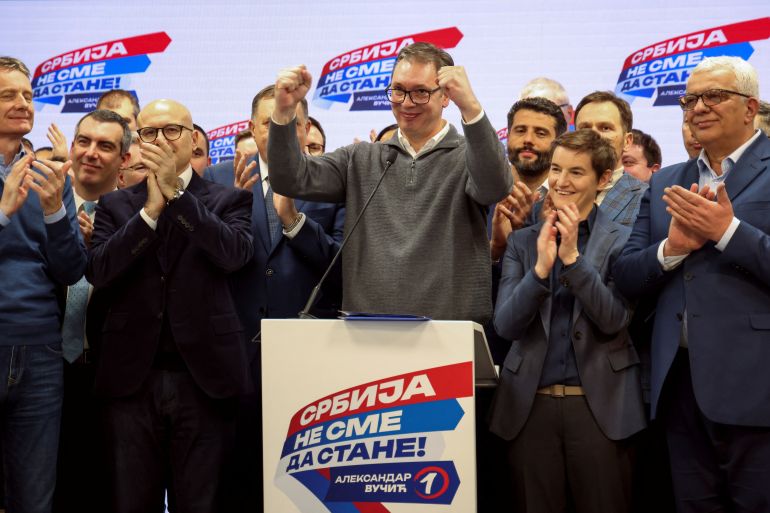Serbia’s ruling SNS ahead in snap election, exit polls show
Ruling populists claim sweeping victory in the parliamentary election, which was marred by reports of significant irregularities.

Exit polls say the ruling right-wing Serbian Progressive Party (SNS) of President Aleksandar Vucic is in the lead in a snap parliamentary election widely regarded as a referendum on his government.
According to projections by the pollsters Ipsos and CeSID on Sunday evening, the SNS won 47 percent of the vote and is expected to hold about 130 seats in the 250-member assembly.
Keep reading
list of 4 itemsSerbia to hold snap elections as president calls for country to be ‘united’
Serbians join anti-government protest following mass shootings
Huge crowds protest Serbia shootings as Vucic plans new movement
The main opposition Serbia Against Violence (SPN) alliance, a centrist coalition vying to unseat the populists who have ruled the Balkan state since 2012, won about 23 percent of votes, said the projections.
The projections are based on a partial count of a representative sample of polling stations. Official results are set to be announced late on Monday.
![Kosovo ethnic Serbs cast their vote at a polling station in the town of Raca, Serbia December 17, 2023. [Reuters/Valdrin Xhemaj]](/wp-content/uploads/2023/12/serbia-1702851362.jpeg?w=770&resize=770%2C513)
The election did not include the presidency but governing authorities backed by the dominant pro-government media have run the campaign as a referendum on Vucic.
Two mass shootings in May, resulting in 18 deaths, including nine elementary school students, led to protests that shook Vucic and the SNS’s decade-long grip on power.
The discontent was made worse by rising inflation, which hit 8 percent in November.
Opposition parties and rights watchdogs also accuse Vucic and the SNS of bribing voters, stifling media freedom, violence against opponents, corruption and ties with organised crime.
Vucic and his allies deny the allegations.
“My job was to do everything in my power to secure an absolute majority in the parliament,” Vucic told reporters on Sunday as he celebrated what he said was the SNS’s victory.
Allegations of irregularities
The elections were marred by reports of major irregularities, both during a tense campaign and on the voting day.
CeSID and Ipsos, which jointly monitored Sunday’s vote, reported irregularities including organised arrivals of voters at polling stations, photographing of ballots and procedural errors.
The state Election Commission said election monitors from the Centre for Research, Transparency and Accountability (CRTA) watchdog were attacked in northern Serbia.
“There were a lot of irregularities,” said opposition leader Radomir Lazovic, citing alleged “vote buying” and “falsification of signatures”.
“We may have had the dirtiest electoral process,” he added.
Posts on social media also fuelled rumours that the government was allowing unregistered voters from neighbouring Bosnia and Herzegovina to cast ballots illegally in the election.
Prime Minister Ana Brnabic dismissed the claims, accusing the reports of spreading chaos.